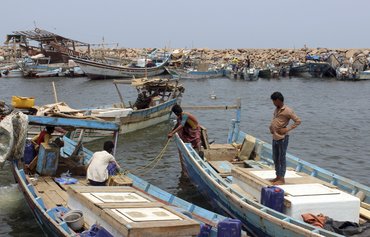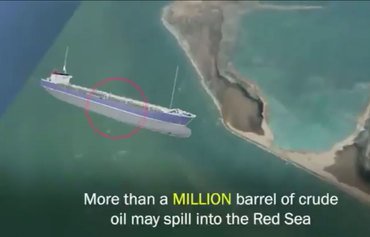The Iranian government's handling of the recent sinking of the Kharg, one of the largest ships in Iran's navy, shows its negligence regarding environmental issues and highlights its hypocrisy in dealing with others.
The sinking of the ship, and the resulting oil spill it created, is just the latest example of many years of environmental and systemic mismanagement on the part of the Iranian regime, observers said.
The Kharg sank on June 2 in the Gulf of Oman, off the coast of Iran's Jask island, after a fire that reportedly started in the engine room. On the same day, a huge blaze broke out at a major oil refinery in southern Tehran.
"The fire that started on the ship likely occurred because the vessel is so old," said a former Iranian naval analyst speaking on condition of anonymity, noting that the Kharg was built in the 1970s.
![A picture obtained by AFP from the Iranian news agency Tasnim on January 4 shows a South Korean-flagged tanker being escorted by the IRGC's Navy after being seized in the Gulf. [Tasnim News/AFP]](/cnmi_am/images/2021/06/14/30262-Korean-flagged-tanker-600_384.jpg)
A picture obtained by AFP from the Iranian news agency Tasnim on January 4 shows a South Korean-flagged tanker being escorted by the IRGC's Navy after being seized in the Gulf. [Tasnim News/AFP]
![Smog obscures the view from the Saad Abad mountain north of the Iranian capital Tehran with high levels of air pollution, engulfing landmarks in the city, on January 13. [Atta Kenare/AFP]](/cnmi_am/images/2021/06/14/30263-Tehran-air-pollution-600_384.jpg)
Smog obscures the view from the Saad Abad mountain north of the Iranian capital Tehran with high levels of air pollution, engulfing landmarks in the city, on January 13. [Atta Kenare/AFP]
The Iranian regime "keeps having to retrofit old equipment" in weapons systems, nuclear facilities or oil and gas refineries, he said, noting that modernising existing equipment is made harder by international sanctions that ban Iran from accessing the latest technology.
Dilapidated equipment in refineries and power plants causes multiple fires throughout Iran every year, but the Islamic Republic routinely disregards the environmental damage of such catastrophes.
Satellite photos published by multiple outlets show a large oil slick and debris around the sinking hull of the Kharg. Iranian officials have, thus far, failed to acknowledge the environmental impact of the incident.
In November 2019, an Iranian port authority official in Bushehr province confirmed an oil leak off the Gulf coast, 20km in length, but both the Oil Ministry and the Foreign Ministry remained silent about the issue.
Widespread environmental woes
Iran's top officials are unwilling to acknowledge that the country is grappling with widespread environmental challenges.
Air pollution has been a persistent problem in Tehran, with the air quality index regularly reporting high levels of air contamination, occasionally forcing schools in the Iranian capital to close.
A 2017 warning by Kaveh Madani, one of the country's top former environmental officials, that Iran is less than 50 years away from running out of fresh drinking water, fell on deaf ears.
Madani, a renowned water resources expert who was invited to return to Iran by President Hassan Rouhani's government to manage the water crisis, repeatedly warned regime officials about environmental concerns.
His warnings were ignored, he was detained on espionage charges for a short time, and left Iran soon after.
In January 2018, the Islamic Revolutionary Guard Corps (IRGC) intelligence department arrested seven environmentalists and conservationists in Iran.
They claimed the cameras they were using to monitor Iran's environmental conditions were intended for spying on sensitive locations.
Kavous Seyyed-Emami, a well-known environmentalist and cheetah conservationist who was falsely accused of using monitoring cameras to spy on Iran's missile depots, died after being tortured in prison that February.
Iranian judiciary officials claimed his death was a suicide.
The Islamic Republic "cares more about ideological purity than technical competency", the naval analyst said.
"It's a problem that plagues the system at every level, contributing to the brain-drain and mismanagement that we see today."
Double standards applied
Though it has ignored the warnings of its own experts about environmental degradation and failing to control oil spills off its Gulf coast, the Islamic Republic has held others to a higher standard than it has applied to itself.
It detained a South Korean tanker in January in the Strait of Hormuz for alleged environmental pollution -- a charge the ship's crew and operators denied.
Iran eventually released the vessel -- three months later -- after the South Korean government got involved.
The seizure appeared to be a thinly veiled attempt to pressure Seoul into releasing some $7 billion in assets tied up in South Korean banks as a result of sanctions over Iran's nuclear programme.
Iran also has ignored environmental concerns in its pursuit of expansionism and regional domination in the Middle East.
In 2019, the US Navy said Iranian limpet mines, likely planted by the IRGC, were responsible for explosions that damaged a Japanese and a Norwegian oil tanker in the Gulf of Oman.
Iran denied the charge, but the US Navy showed video footage of IRGC operatives removing an unexploded mine from the Japanese vessel.

![Iran's second-largest naval vessel, the Kharg, sank on June 2 in the Gulf of Oman. [Dana.ir]](/cnmi_am/images/2021/06/14/30244-Iran-vessel-Kharg-600_384.jpg)






